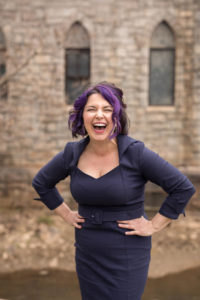 The Disciples Leadership Institute (DLI) brings together emerging Disciples leaders (clergy and lay), seeking to deepen understanding and develop relationships across perceived boundaries of race, culture, and language. This month we highlight past DLI participant Hollie Woodruff as she shares what she gained from the DLI program and how it continues to influence her life and ministry.
The Disciples Leadership Institute (DLI) brings together emerging Disciples leaders (clergy and lay), seeking to deepen understanding and develop relationships across perceived boundaries of race, culture, and language. This month we highlight past DLI participant Hollie Woodruff as she shares what she gained from the DLI program and how it continues to influence her life and ministry.
On her current ministry:
I currently serve as the lead pastor at Seventh Street Christian Church in Richmond, Virginia, though I wish to recognize the amazing team I get to work with, including MDiv student, Jayme Babczak. We’ve been working together at Seventh Street almost as long as I’ve been here, co-creating and pastoring together.
Seventh Street Christian Church is a congregation that has been around in some form for nearly 190 years! It started as Sycamore church and, over its history, has moved and merged into what is known today as Seventh Street Christian Church. Like many of our congregations, we are navigating the landscape of changes in religious America. How do we meet the religious needs of this generation? How might we have failed them? Where are we most successful? How do I navigate those questions while supporting my current congregation? Besides the traditional pastor responsibilities like preaching, teaching, and pastoral care, I am also taking care of other responsibilities – building management, renovations and rental agreements – that makes me glad I grew up with a dad in construction and have my Bachelor of Business Administration.
On memories from participating:
My best memories are connected to the relationships I built. Some of my closest colleagues came out of DLI and I am deeply grateful.
I remember taking walks with Amy Gopp early in the morning around the campus of Eden Seminary. I remember struggling with challenging topics such as “what is truth.” I remember a powerful sermon given by Earle Fisher about the power of friendship in the story of the paralytic man at Capernaum. I still draw upon the worship services that engaged all our senses.
When I think about the people I was with in DLI, I know many of them are doing so many amazing things in the church – they are congregational pastors, regional ministers, leaders of justice ministries, interim ministers, and authors! AMAZING people!
On important learnings:
I know that I’m not alone in ministry. We can forget that. Congregational ministry can be so isolating, so just to know I can pick up the phone and get someone else’s perspective on an issue is always reassuring. DLI was the first time that I was a part of something in the Christian Church (Disciples of Christ) that was intentional about the diversity of voices – people of color, different gender orientations, people who are part of the LGBTQ community, and younger voices. This sounds crazy today as I believe we’re much better about it now, but back in 2005 and 2006, it was kind of a novelty.
On how it shaped her sense of call:
A skill I will always be working to cultivate is listening. DLI helped me hone in on that, particularly in working with a group of diverse leaders. As a dominant straight white voice, I (we) need to be quiet and open our ears. I think part of being a good leader is always asking one or more of the following: “Do I need to talk? Do I need to share it now? Does it need to come from me?”
I’m grateful to DLI for its contribution to the continued shaping of my call.
